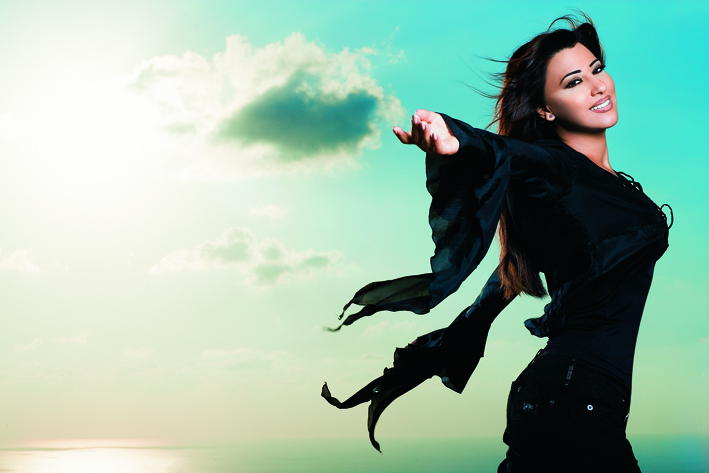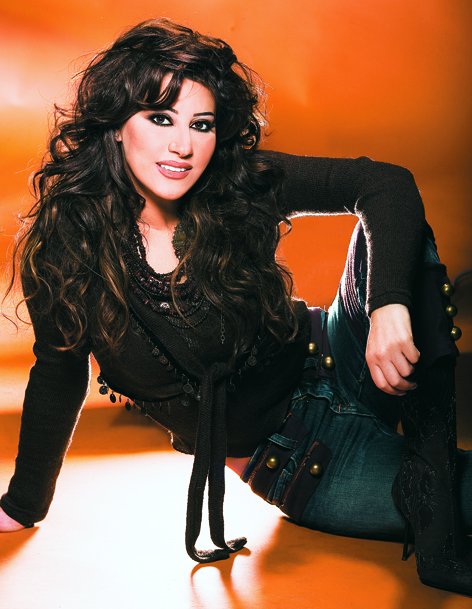Prestige issue 153, February 2006
In her home reflecting the warmth of her heart, Najwa Karam, aptly named Princess of Lebanese song, conquered me from the first moment we met, both for her sweetness as for her great culture. During this open interview with this superstar adored by the Lebanese, Prestige discovers a very sensitive woman, loving of her domain and of Lebanon that she sings with all her heart and her beautiful voice. With a remarkable personality, an overflowing kindness, and in the most poetic Arabic, she answers my questions on an affable and imposing tone.

Photo of her album Keber el Hob
Najwa Karam, what memories do you keep from your childhood? My childhood is a wonderful memory. I lived it very well, which is not the case for many children today. It is true that I never got all what I dreamed of, but fortunately this led me to appreciate the smallest gift. When I go back in time and look back, I like small Najwa, the playful little girl I was.
You abandoned teaching for the song. Both businesses are a mission. In education, the teacher trains children and prepares them to compose the society and the future generation. Culture is the future. Like education, art is a vocation but this time it is not in a small class, it is in a world court where the artist is in a refined and exclusive situation. The art work must absolutely represent the civilized image of the country. In my opinion, art is the most noble thing in life.
Why did you choose teaching for a start? Coming from a very conservative environment, my father insisted that I stay in the field of education and teaching. Frankly, I joined the world of singing against his will. I am convinced that when God traces the destiny of man, nothing can change it. Over time, I committed myself to give the best image of art.
What was your father’s reaction when you told him your willingness to embrace an artistic career? First, at the initiative of my sister who lived in Beirut, I participated in a television program entitled Layali Loubnan, whose theme is similar to Studio Al Fan. What was my father’s surprise when he saw me on TV! He finally accepted my decision to pursue a career as an artist, after all the compliments and encouragement of the jury who felt that my talent deserves a place on the Lebanese art scene. In addition, the family atmosphere helped me a lot and encouraged my father to be concerned with the mission that I have chosen. After the success I achieved at Layali Loubnan and more specifically in the category of the Lebanese folk art, I took two years of vocalization and musical theory with the late Zaki Nassif, then two others with Fouad Awad before working with great composers such as Elie Choueiri, Ihsan Mounzer and Nour el Mallah, Georges Yazbeck … I managed to create my own artistic way signed Najwa Karam, that I wanted unique and not a copy of other artists.
What is the secret of your modesty despite your tremendous success? The true artist is the one who climbs the stairs step by step in a healthy and authentic way, knowing that pride would lead nowhere. He should always question himself, regardless of his success. He must get rid of the clothes of his glory before going home, to be able to start again. Keeping feet on the ground is the surest path to success.
You are the princess of Lebanese song, and you are responsible for its promotion in the world. Isn’t this burden heavy on you? I believe a lot in my job and I have great confidence in my country. I am also convinced that, to persevere, the artist must have a cause in which he believes and defends, otherwise he will disappear quickly.
It must be said that the Lebanese folklore is my cause. In my opinion, the country that has no folklore has no assets and, with time, it will be forgotten. The foundations of Baalbeck are secure, if not the weather would have torn them from their roots. Ditto for the pyramid, if it was badly built, could not cope with the vagaries of centuries. I gave these examples to say that we need bases and folklore is one of them. This responsibility is always pushing me to choose the best regarding words and music. That said, satisfying the different tastes of the public is hardly an easy task. As continuity is, in itself, a very tough process. For all these reasons, I try to combine in my repertoire the past and the present in order to continue and to persevere.
Does the Lebanese song reach easily the Arab public? Some years ago, the Lebanese dialect was almost incomprehensible in Arab countries, unlike the Egyptian who entered the houses through the Egyptian cinema. Today, in the era of satellites where the world has become a global village, it is no longer the case. Lebanese dialect now attracts audiences from the Middle East.
Why haven’t you tried, like other stars, singing in Egyptian? I’ve managed my career through the Lebanese song that is my specialty. This is why I try not to slip while singing in a different dialect, I fear not meeting the success that accompanies me in my artistic path.
It is said that the “Amira” Najwa occupies a prominent place with Rotana. Why? (Note: this has coincided with the arrival of the CEO of Rotana Salem el Hindi). Any relationship based on respect, beyond personal interests, perseveres. The one existing between the singer and the production house is no exception to the rule. In business, one must leave aside the friendly relations, to allow interested parties to put their respective terms. In case of defective clause, the amendment of the contract is the simplest solution. Rotana and I have nothing to fear, esteem and mutual respect being our main locomotives.
What are the conditions that make a star? Talent is a major condition and stage presence, plus respect for oneself and others.
And what about physical beauty for a star? Universal value appreciated by everyone, physical beauty may be temporary. Because, ultimately, it is the beautiful voice that is needed.
Tell us about your new CD and the video clip that you prepare with director Said el Marouk? My album Keber el Hob is full of love. Love means a lot to me. I’ve shot video clip Bhebbak Wallaw and Bkhaf Min el May. From there, I admit that I do not consider myself as a “video clips singer” despite the prominent place that this art has currently on the audiovisual scene. However, the artist who does not like the playback prefers to appear before his audience with whom he has direct contact. Sometimes when I choose some songs to shoot video clip, I feel guilty towards other songs that may not have the same response. So I avoided for two consecutive years the videos.
Each year, your audience waits for your new album in May, why the delay? The political and security situation in Lebanon was not encouraging. And we, the artists are concerned like everyone else, we’re not likely to release an album when all the Lebanese people is plunged into sadness and pain.
What do you remember about your collaboration with Wadih Safi through the song “Wa Kberna ya Bayeh”? This duo is a true masterpiece, it is the most beautiful mark of my artistic career.
Collaborating with the big Wadih Safi is a very fruitful experience. Wa Kberna is a very valuable work that has enriched my repertoire. It is a dream that has been with me all my life and I’ve finally realized. Moreover, this song is in itself a message in our Oriental society on the father-daughter relationship where the dialogue between the two is often absent. The purpose of this single is to remind every father that his daughter, at some point, is no longer a child but an adult who confronts life and love in broad daylight with his blessing. The mission of the father is to show her the right path.
Who was your idol? On a personal level, it is my mother. I respect her patience and how she solves life’s problems with a smile, simplicity and calmness. Artistically, it is unquestionably Sayidé Feyrouz with her unique voice and her greatness. Feyrouz School is not just a song, it is a colossal work, it is my pride.
You help disadvantaged children in Zahle … I attach great importance to education in particular the youth, because culture erases flaws: hatred, theft … the one who hates is not smart and the one who steals is devoid of culture. Education instills good manners and gives the person high moral values.
Does the fact of not having children leave a void in your life? I like to have children. But we must first feel safe in order to secure their future. On the other hand, I live in this moment inner peace and I do not want at any price to introduce a companion in my life that will disturb this state of tranquility.
What are the values to which you are attached? Oriental values such as hospitality and generosity. I respect the worthy woman in her love and in her relationship with her beloved. I also appreciate in the Oriental man courage and intelligence. Orientals are also known for their sense of family. Great value to which we are jealously attached. Another equally important value: patriotism.
What is love to you? The universe is based on love. This is the beginning and the end. A man without love is really sick and a burden to others.
You are a romantic woman who loves to love and be loved. Do you still believe in soul mates and true love? Certainly. Love exists. But what can hinder this noble feeling, it is the behavior and mistreatment.
Does your celebrity scare men? Surely, if they have no personality and no confidence in themselves! However, if a man is confident, well he would be proud of me.
Do you think one day to retire from the world of songs? I think so. The artist must leave the stage at his peak as soon as the image of his art begins to tarnish. He will be unfair to himself and to the art he had already submitted his audience if he persists to pursue his artistic career. We must respect art and make its nobility, otherwise it is better to change course, or bow in time.
Zahle is known for its artistic and cultural wealth, how do you explain this phenomenon? This may be due to river Bardawni that gives us this beauty and lyricism (smile). Zahle is indeed rich in talent as other regions in the world. It is true that many Zahliotes have had their share in the world of poetry, literature and the arts.
What makes Najwa Karam happy? All that is beautiful, sincere, simple and authentic.
… And unhappy? Infidelity. This negative attitude gives me the creeps and makes me suffer, me who gives from all my heart without asking for anything in return.
Do you have any regrets? Not really. I draw positive lessons from the mistakes I made. All this is part of the experience and enriching.
Your last word. I would like to tell your distinguished and remarkable readers, like your monthly whom I wish an unbeatable prestige, that I will always try to be up to their aspirations.
Interviewed by MARIA NADIM






